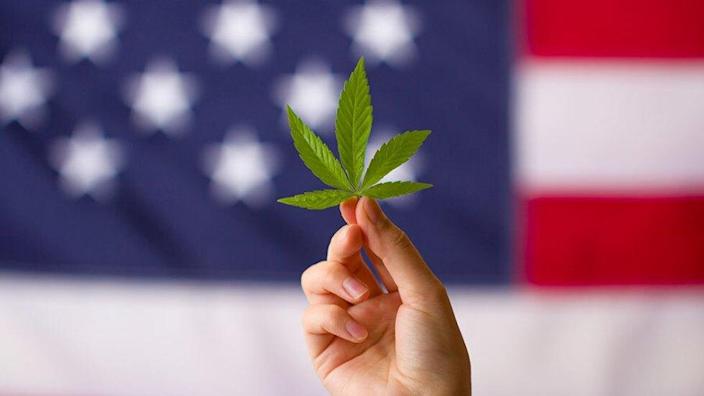Welcome to Friday’s Overnight Health Care, where we’re following the latest moves on policy and news affecting your health. Subscribe here.
It was a big day for U.S. soccer fans, as the U.S. men’s national team drew England and Iran in its group for the World Cup next fall.
The House voted to decriminalize marijuana, but it’s not clear what happens next, as deep partisan divisions remain.
For The Hill, we’re Peter Sullivan, Nathaniel Weixel and Joseph Choi. Send us tips and feedback at psullivan@thehill.com, nweixel@thehill.com and jchoi@thehill.com.
Let’s get started.
House approves bill decriminalizing marijuana
The House passed legislation on Friday that would end federal prohibition of marijuana and eliminate the longstanding criminal penalties for anyone who distributes or possesses it.
The bill, dubbed the Marijuana Opportunity Reinvestment and Expungement (MORE) Act, would remove cannabis from the list of banned federal substances, expunge certain past offenses associated with cannabis, impose a 5 percent federal tax on cannabis that eventually increases to 8 percent, and fund programs aimed at helping communities affected by the war on drugs.
The bill passed largely along party lines 220-204, with three Republicans joining all but two Democrats in support.
The legislation comes amid a growing shift in public attitudes towards marijuana, with most states passing some sort of decriminalization or legalization law.
Cloudy future: The measure now goes to the Senate, but it’s not clear if it can gain the needed 60 votes. Majority Leader Charles Schumer (D-N.Y.) is working with fellow Democrats to introduce a marijuana legalization bill as soon as this spring.
The White House has also not yet issued a statement on whether President Biden supports the legislation. Biden has said he opposes broad legalization.
As it stands now, marijuana is classified by the federal government as a “schedule 1” drug, meaning it is considered highly addictive with no medicinal value— the same as heroin, and worse than fentanyl, methamphetamine and cocaine.
GOP STILL HAS DEEP DOUBTS ABOUT MARIJUANA
The vast majority of House Republicans on Friday voted against a bill ending the federal prohibition on marijuana, underscoring the deep reservations that remain in the GOP over its use and allowing it to become widely available even as support for legalization grows.
Republicans on the House Judiciary Committee warned that passage of the bill would lead to widespread use of the drug. They also said it ignores the established science about marijuana’s harmful effects.
GOP lawmakers are also perturbed that Republican amendments for more restriction were not considered.
“Our country is already suffering from many Biden-inflicted crises. Now Democrats are making it their priority to expand accessibility of addictive, behavior-altering, recreational drugs,” said Rep. Bob Good (R-Va.), adding that programs in the bill would “produce a negative impact for our children and our communities.”
As public opinion has warmed toward cannabis legalization, so have Republican politicians. Former GOP House Speaker John Boehner (Ohio) joined the board of a cannabis investment company after he left the House.
When the MORE Act previously passed the House in 2020, five Republicans joined Democrats to support it. One of those five, Rep. Brian Mast (R-Fla.), said he would “probably” vote in favor of the legislation again.
Rep. Bob Gibbs (R-Ohio) said that he has had a personal evolution in coming to support legalization for medicinal cannabis, but not for recreational use.
Some Republicans found regulatory issues with the bill, but broadly, the MORE Act vote showed that a number of Republicans are resistant to recreational legalization.
Rep. Andy Harris (R-Md.), a physician, called recreational legalization a “bad idea,” saying that the director of the National Institute on Drug Abuse has testified that “from a health perspective, you shouldn’t legalize recreational marijuana.”
Pregnancy doubles breakthrough COVID risk: study
A study published on Thursday found that pregnancy nearly doubles the risk of breakthrough COVID-19 cases, closely followed in risk by a solid organ transplant.
The analysis, based on medical records of nearly 14 million people, found vaccinated pregnant people have the greatest risk of developing COVID-19 — more likely than those who had solid organ transplant or an immune system deficiency.
The Centers for Disease Control and Prevention (CDC) has been urging people to get coronavirus shots before or during pregnancy, trying to combat the fear among some communities that the shots can be harmful.
The authors said the findings support the CDC’s recommendation that patients with a high-risk comorbidity may need to use enhanced infection prevention control beyond vaccination to minimize the risk of a COVID-19 breakthrough infection.
Unknown: But the study didn’t find any reason for the increased risk. It also did not show how sick the patients became when they were infected with the virus after having been vaccinated.
CDC: MORE THAN 40 PERCENT OF TEENS ‘PERSISTENTLY SAD’ AMID PANDEMIC
More than 40 percent of teens said they felt persistently sad or hopeless during the pandemic, underscoring the toll that COVID-19 has taken on teens’ mental health, a new Centers for Disease Control and Prevention (CDC) survey found.
The CDC survey, released on Thursday, found that among 7,705 U.S. high school students surveyed, 44 percent of them reported feeling sad or hopeless almost every day for at least two weeks in a row. Thirty-seven percent said their mental health was most of the time or always not good during the pandemic.
“These data echo a cry for help,” CDC acting Principal Deputy Director Debra Houry said in a statement. “The COVID-19 pandemic has created traumatic stressors that have the potential to further erode students’ mental wellbeing.”
POLL: MORE AMERICANS SUPPORT THAN OPPOSE 15-WEEK ABORTION BANS
As the fight around abortion will reach a head this summer at the Supreme Court, a new poll from The Wall Street Journal found more Americans support a ban on abortions 15 weeks into a pregnancy than oppose it.
In the poll, 48 percent said they strongly or somewhat favored a 15-week abortion ban with the exception of protecting the health of the mother, while 43 percent were opposed to such a ban.
The poll found 31 percent strongly supported the ban and 17 percent somewhat supported it. On the opposite side, about 34 percent strongly opposed the measure while around 10 percent somewhat opposed it.
The results come as multiple Republican-led states have passed bills that ban abortions after a woman is 15-weeks into her pregnancy.
???? Breaking the morning show mold. Bursting the Beltway bubble. TUNE-IN TO RISING, now available as a podcast.
WHAT WE’RE READING
-
Califf admits controversy over FDA’s Alzheimer’s drug decision impacted experts’ trust in the agency (Stat)
-
Black students experiencing racism on campus lack mental health support (Kaiser Health News)
-
It used to be hard to find a coronavirus test. Now there are too many (Washington Post)
STATE BY STATE
-
As US nears 1 million Covid deaths, one hard-hit county grapples with unthinkable loss (Kaiser Health News)
-
Mississippi legislators want to save money on prisoners’ health care. Reluctance to expand parole makes that tricky (Mississippi Today)
OP-EDS IN THE HILL
That’s it for today, thanks for reading. Check out The Hill’s health care page for the latest news and coverage. See you Monday.
For the latest news, weather, sports, and streaming video, head to The Hill.




